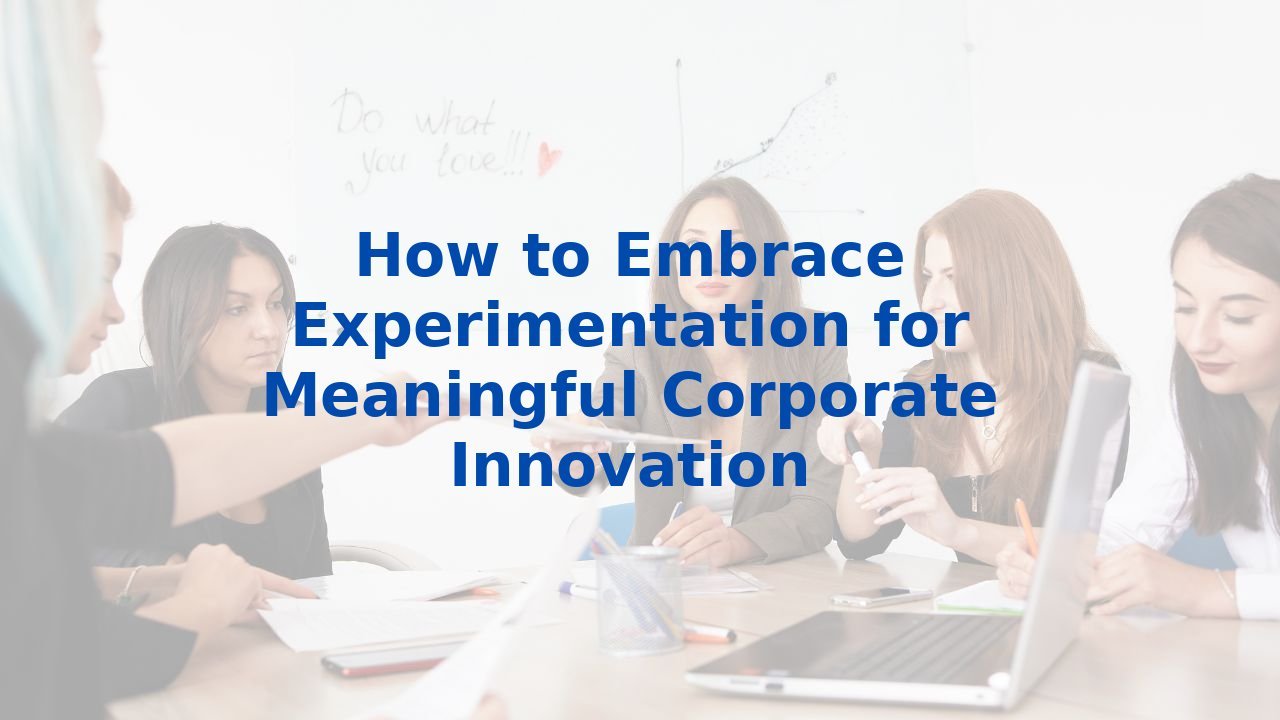How to Embrace Experimentation for Meaningful Corporate Innovation
How to Embrace Experimentation for Meaningful Corporate Innovation
In today’s rapidly evolving corporate landscape, the ability to innovate is not just a competitive advantage—it’s a necessity. Organizations must embrace a culture of experimentation to thrive. This post explores how embracing experimentation, enhanced by artificial intelligence (AI), can lead to meaningful corporate innovation and operational excellence.
The Power of Experimentation
Experimentation at its core is about testing ideas in a low-risk environment. It allows organizations to discover what works and what doesn’t without the fear of jeopardizing resources. By implementing a structured approach to experimentation, organizations can challenge the status quo, foster creativity, and encourage employees to contribute their insights. This process involves defining hypotheses, running trials, collecting data, and iterating based on feedback.
Successful innovation relies on a cycle of continuous learning and adaptability. Companies that are willing to embrace a trial-and-error mindset are more likely to discover groundbreaking solutions that serve customers better and enhance operational efficiency.
Integrating AI for Enhanced Experimentation
Artificial intelligence plays a transformative role in the experimentation process. By leveraging AI, organizations can optimize various stages of their experiments, thereby turning data into actionable insights. AI-powered analytics tools can offer predictive modeling, enabling teams to foresee potential outcomes and adjust their experiments accordingly.
“Data is the new oil.”
Just as oil must be refined to create value, raw data from experiments must be analyzed and synthesized into insights. AI simplifies this data journey, making it easier for teams to draw meaningful conclusions and understand market trends. By automating data collection and analysis, organizations free up valuable time and resources, allowing employees to focus on creative problem-solving.
Improving Efficiency for Innovation
AI doesn’t just amplify experimentation; it enhances overall operational efficiency. By automating routine tasks and providing intelligent recommendations, AI can streamline workflows and reduce the time spent on mundane responsibilities. This efficiency means that team members can prioritize more strategic initiatives—those that push the envelope and drive innovation.
For instance, AI can facilitate rapid prototyping in product development, allowing teams to iterate on designs quickly based on consumer feedback. Integrating AI into this creative process can lead to more innovative solutions that meet changing customer demands and preferences.
Training Your Workforce for AI Empowerment
To truly harness the capabilities of AI, it’s essential to invest in training your employees. Upskilling your workforce in AI not only empowers them to utilize new technologies effectively but also fosters a culture that embraces innovation. A well-trained employee base can better interpret AI insights, understanding how to implement them in day-to-day operations.
The benefits of training extend beyond theoretical knowledge. Providing comprehensive AI training tailored to your organization’s needs can position your team to capitalize on AI’s potential, ensuring that they are not just consumers of technology but innovators themselves. As teams gain confidence in using AI tools, they will be more inclined to experiment, push boundaries, and ultimately, drive the organization’s innovation efforts.
Creating a Culture of Innovation and Experimentation
Building a culture that prioritizes experimentation and innovation requires a shift in mindset. Encouragement from leadership is crucial; leaders must champion experimentation as a core value. Creating a safe environment for employees to propose, test, and learn from new ideas without the fear of failure is essential for fostering innovation.
“Mistakes should be examined, learned from, and discarded; not dwelled upon and stored.”
Encouraging open communication and collaboration across departments can also expedite the innovation process. Diverse perspectives can lead to creative solutions that a homogenous group may overlook. When every employee feels valued and empowered to contribute to the innovation conversation, the result can be a pool of exceptionally vibrant ideas.
Conclusion
For organizations aiming to remain relevant in a fast-paced environment, embracing experimentation is paramount. By integrating AI to enhance experimentation processes, improving operational efficiency, and fostering a culture of innovation through employee training, companies can realize the true potential of their workforce and drive meaningful corporate innovation.
To maximize the impact of these initiatives, consider investing in comprehensive AI training tailored to meet your organization’s specific needs. This strategic approach equips your entire workforce with essential AI skills, ensuring they are prepared for the challenges and opportunities that lie ahead. To explore the possibilities, visit Complete AI Training.



